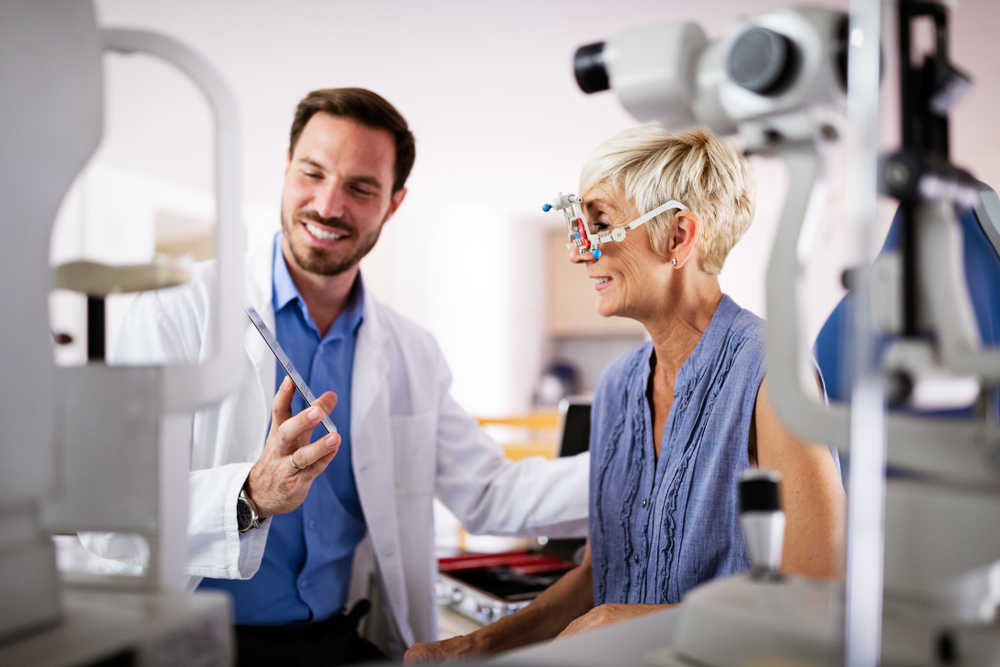
Many people tend to visit an eye care professional only when they experience noticeable vision problems or discomfort. However, regular comprehensive eye exams are crucial for maintaining eye health and detecting potential issues before they become severe.
Keep reading to learn more about what happens during comprehensive eye exams and why they are important!
What is a Comprehensive Eye Exam?
A comprehensive eye exam is a thorough evaluation of your eye health and visual function. Unlike a simple vision screening, which primarily checks visual acuity, a comprehensive exam dives deeper into the intricate structures and functions of your eyes.
At Simone Eye Center, our eye doctors combine advanced diagnostic technologies with clinical expertise to provide a comprehensive assessment of your vision and eyes. The exam typically begins with a detailed review of your medical history, including any current symptoms, family history of eye conditions, and general health conditions that may impact your eye health.
This information helps your eye doctor tailor their exam to your specific needs and risk factors. After reviewing your medical history, your eye doctor or technician will conduct a series of tests to evaluate various aspects of your vision.
These tests include understanding how well you can see and how well your eyes move with each other, as well as tests to determine your glasses prescription, if needed. They will also measure your eye pressure, which is a critical factor in detecting glaucoma.
Your eye doctor will then perform a slit-lamp examination to closely inspect the structures of your eye, including the cornea, iris, and lens.
Will My Eyes Be Dilated During an Eye Exam?
One of the most crucial components of a comprehensive eye exam is the dilated fundus exam and is an important part of a comprehensive eye exam. While some patients may feel apprehensive about this part of an eye exam, it is essential for obtaining a clear view of the retina and other structures inside the eye.
By dilating your pupils, they can get a clearer and wider view of these structures and are able to detect subtle changes or abnormalities that might otherwise go unnoticed.
During the exam, your eye doctor will use various instruments to thoroughly inspect the retina, optic nerve, and blood vessels. This allows them to detect a wide range of conditions, including retinal detachments, macular degeneration, and diabetic retinopathy.
The effects of dilation can last for several hours after the examination. During this time, you may experience increased light sensitivity and blurred near vision.
For this reason, it is recommended that you bring sunglasses along with you to your appointment or arrange for someone to take you home.
What Eye Conditions Are Diagnosed During an Eye Exam?
A comprehensive eye exam allows your eye doctor to diagnose a wide range of eye conditions, many of which may not be apparent to you. At Simone Eye Center, our eye doctors routinely screen for and diagnose the following conditions:
Refractive Errors: These include myopia (nearsightedness), hyperopia (farsightedness), astigmatism, and presbyopia. Through careful refraction and visual acuity testing, we can determine the precise optical correction needed to optimize your vision.
Glaucoma: Often called the “silent thief of sight,” glaucoma can cause irreversible vision loss if left untreated. Your eye doctor will assess your intraocular pressure, evaluate your optic nerve, and perform visual field testing to detect glaucoma in its early stages.
Cataracts: This age-related clouding of the eye’s natural lens is a common cause of vision impairment in older adults. During the slit-lamp examination, your eye doctor can assess the clarity of your lens and determine if cataract surgery may be beneficial.
Macular Degeneration: This condition affects the central portion of the retina, known as the macula, and can lead to significant vision loss.
Dry Eye Syndrome: Your eye doctor will evaluate your tear production and quality to diagnose dry eye syndrome, a common condition that can cause discomfort and visual disturbances.
Is it time for you to have a comprehensive eye exam? Schedule an appointment at Simone Eye Center in Warren or Macomb Township, MI, today!



